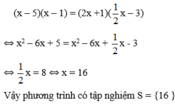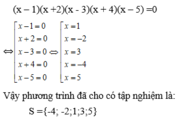Giải các phương trình sau: ( x - 5 ) ( x - 1 ) = ( 2 x + 1 ) 1 2 x - 3
Hãy nhập câu hỏi của bạn vào đây, nếu là tài khoản VIP, bạn sẽ được ưu tiên trả lời.



a) \(\dfrac{2}{x-3}+\dfrac{x-5}{x-1}=1\)
\(\Leftrightarrow\dfrac{2\left(x-1\right)+\left(x-5\right)\left(x-3\right)}{\left(x-3\right)\left(x-1\right)}=1\)
\(\Leftrightarrow2\left(x-1\right)+\left(x-5\right)\left(x-3\right)=\left(x-3\right)\left(x-1\right)\)
\(\Leftrightarrow2x-2+x^2-8x+15-x^2+4x-3=0\)
\(\Leftrightarrow-2x+10=0\) \(\Leftrightarrow x=5\)
b) \(\dfrac{x+1}{x-1}-\dfrac{x-1}{x+1}=\dfrac{16}{x^2-1}\) (2)
Ta có \(x^2-1=\left(x-1\right)\left(x+1\right)\)
ĐKXĐ: \(x^2-1\ne0\Leftrightarrow x\ne\pm1\)
(2) \(\Leftrightarrow\dfrac{\left(x+1\right)^2-\left(x-1\right)^2-16}{x^2-1}=0\)
mà \(x^2-1\ne0\) để phương trính có nghĩa
\(\Leftrightarrow\left(x+1\right)^2=\left(x-1\right)^2-16=0\)
\(\Leftrightarrow x^2+2x+1-x^2+2x-1-16=0\)
\(\Leftrightarrow4x-16=0\) \(\Leftrightarrow x=4\)

\(a,\dfrac{x-3}{x}=\dfrac{x-3}{x+3}\)\(\left(đk:x\ne0,-3\right)\)
\(\Leftrightarrow\dfrac{x-3}{x}-\dfrac{x-3}{x+3}=0\)
\(\Leftrightarrow\dfrac{\left(x-3\right)\left(x+3\right)-x\left(x-3\right)}{x\left(x+3\right)}=0\)
\(\Leftrightarrow x^2-9-x^2+3x=0\)
\(\Leftrightarrow3x-9=0\)
\(\Leftrightarrow3x=9\)
\(\Leftrightarrow x=3\left(n\right)\)
Vậy \(S=\left\{3\right\}\)
\(b,\dfrac{4x-3}{4}>\dfrac{3x-5}{3}-\dfrac{2x-7}{12}\)
\(\Leftrightarrow\dfrac{4x-3}{4}-\dfrac{3x-5}{3}+\dfrac{2x-7}{12}>0\)
\(\Leftrightarrow\dfrac{3\left(4x-3\right)-4\left(3x-5\right)+2x-7}{12}>0\)
\(\Leftrightarrow12x-9-12x+20+2x-7>0\)
\(\Leftrightarrow2x+4>0\)
\(\Leftrightarrow2x>-4\)
\(\Leftrightarrow x>-2\)

1/ \(2\left(x-5\right)=\left(-x-5\right)\)
\(\Leftrightarrow2x-10=-x-5\)
\(\Leftrightarrow3x=5\)
\(\Leftrightarrow x=\dfrac{5}{3}\)
Vậy: \(S=\left\{\dfrac{5}{3}\right\}\)
==========
2/ \(2\left(x+3\right)-3\left(x-1\right)=2\)
\(\Leftrightarrow2x+6-3x+3=2\)
\(\Leftrightarrow-x=-7\)
\(\Leftrightarrow x=7\)
Vậy: \(S=\left\{7\right\}\)
==========
3/ \(4\left(x-5\right)-\left(3x-1\right)=x-19\)
\(\Leftrightarrow4x-20-3x+1=x-19\)
\(\Leftrightarrow0x=0\)
Vậy: \(S=\left\{x|x\text{ ∈ }R\right\}\)
===========
4/ \(7-\left(x-2\right)=5\left(2-3x\right)\)
\(\Leftrightarrow7-x+2=10-15x\)
\(\Leftrightarrow14x=1\)
\(\Leftrightarrow x=\dfrac{1}{14}\)
Vậy: \(S=\left\{\dfrac{1}{14}\right\}\)
==========
5/ \(2x-\left(5-3x\right)=7x+1\)
\(\Leftrightarrow2x-5+3x=7x+1\)
\(\Leftrightarrow-2x=6\)
\(\Leftrightarrow x=-3\)
Vậy: \(S=\left\{-3\right\}\)
[---]
Chúc bạn học tốt.
1. \(2\left(x-5\right)=-x-5\)
\(\Leftrightarrow3x=5\)
\(\Leftrightarrow x=\dfrac{5}{3}\)
Vậy \(S=\left\{\dfrac{5}{3}\right\}\)
2. \(2\left(x+3\right)-3\left(x-1\right)=2\)
\(\Leftrightarrow2x+6-3x+3=2\)
\(\Leftrightarrow x=7\)
Vậy \(S=\left\{7\right\}\)
3. \(4\left(x-5\right)-\left(3x-1\right)=x-19\)
\(\Leftrightarrow4x-20-3x+1-x+19=0\)
\(\Leftrightarrow0x=0\)
Vậy \(S=\left\{x\in R\right\}\)
4. \(7-\left(x-2\right)=5\left(2-3x\right)\)
\(\Leftrightarrow7-x+2-10+15x=0\)
\(\Leftrightarrow14x-1=0\)
\(\Leftrightarrow x=\dfrac{1}{14}\)
Vậy \(S=\left\{\dfrac{1}{14}\right\}\)
4. \(2x-\left(5-3x\right)=7x+1\)
\(\Leftrightarrow2x-5+3x-7x-1=0\)
\(\Leftrightarrow-2x-6=0\)
\(\Leftrightarrow x=-3\)
Vậy \(S=\left\{-3\right\}\)


⇔ ( x - 1 )( x + 2 )( 7 - 5x ) = 0

Vậy phương trình có tập nghiệm là S = { - 2; 1; 7/5 }.

\(x-5=\frac{1}{3\left(x+2\right)}\left(đkxđ:x\ne-2\right)\)
\(< =>3\left(x-5\right)\left(x+2\right)=1\)
\(< =>3\left(x^2-3x-10\right)=1\)
\(< =>x^2-3x-10=\frac{1}{3}\)
\(< =>x^2-3x-\frac{31}{3}=0\)
giải pt bậc 2 dễ r
\(\frac{x}{3}+\frac{x}{4}=\frac{x}{5}-\frac{x}{6}\)
\(< =>\frac{4x+3x}{12}=\frac{6x-5x}{30}\)
\(< =>\frac{7x}{12}=\frac{x}{30}< =>12x=210x\)
\(< =>x\left(210-12\right)=0< =>x=0\)

a/ 4x + 20 = 0
⇔4x = -20
⇔x = -5
Vậy phương trình có tập nghiệm S = {-5}
b/ 2x – 3 = 3(x – 1) + x + 2
⇔ 2x-3 = 3x -3+x+2
⇔2x – 3x = -3+2+3
⇔-2x = 2
⇔x = -1
Vậy phương trình có tập nghiệm S = {-1}
câu tiếp theo
a/ (3x – 2)(4x + 5) = 0
3x – 2 = 0 hoặc 4x + 5 = 0
- 3x – 2 = 0 => x = 3/2
- 4x + 5 = 0 => x = – 5/4
Vậy phương trình có tập nghiệm S= {-5/4,3/2}
b/ 2x(x – 3) – 5(x – 3) = 0
=> (x – 3)(2x -5) = 0
=> x – 3 = 0 hoặc 2x – 5 = 0
* x – 3 = 0 => x = 3
* 2x – 5 = 0 => x = 5/2
Vậy phương trình có tập nghiệm S = {0, 5/2}

1) \(ĐK:x\ne2\)
Nếu \(x>2\)
BPT ⇔ \(x^2-2x+5-\left(x-1\right)\left(x-2\right)\ge0\) ⇔ \(x^2-2x+5-\left(x^2-3x+3\right)\ge0\)
⇔\(x+2\ge0\) ⇔\(x\ge-2\) ⇒ Lấy \(x\ge2\)
Nếu \(x< 2\)
BPT ⇔\(\dfrac{-\left(x^2-2x+5\right)}{x-2}-x+1\ge0\) ⇔\(-x^2+2x-5-\left(x-1\right)\left(x-2\right)\ge0\)
⇔\(-x^2+2x-5-x^2+3x-2\ge0\)
⇔\(-2x^2+5x-7\ge0\)
⇔\(x^2-\dfrac{5}{2}x+\dfrac{7}{2}\le0\)
⇔\(\left(x-\dfrac{5}{4}\right)^2\le\dfrac{11}{4}\)
⇔\(\left[{}\begin{matrix}x-\dfrac{5}{4}\le\dfrac{11}{4}\\x-\dfrac{5}{4}\le\dfrac{-11}{4}\end{matrix}\right.\) ⇔\(\left[{}\begin{matrix}x\le4\\x\le\dfrac{-3}{2}\end{matrix}\right.\) ⇔ \(x\le\dfrac{-3}{2}\)
S= [2;+∞)U(-∞;\(\dfrac{-3}{2}\)]
2) \(ĐK:x\ne-1\)
Nếu \(x>-1\)
BPT ⇔ \(2x-3-2\left(x+1\right)< 0\) ⇔\(2x-3-2x-2< 0\)
⇔\(-5< 0\) ( luôn đúng với mọi \(x>-1\))
Nếu \(x< -1\)
BPT⇔\(\dfrac{-\left(2x-3\right)}{x+1}-2< 0\) ⇔\(-\left(2x-3\right)-2\left(x+1\right)< 0\) ⇔\(-4x+1< 0\) ⇔ \(x>\dfrac{-1}{4}\)
Vậy S=....

a: Ta có: \(3x-5\ge2\left(x-6\right)-12\)
\(\Leftrightarrow3x-5\ge2x-24\)
hay \(x\ge-19\)
b: Ta có: \(2\left(5-2x\right)\ge3-x\)
\(\Leftrightarrow10-4x-3+x\ge0\)
\(\Leftrightarrow-3x\ge-7\)
hay \(x\le\dfrac{7}{3}\)
